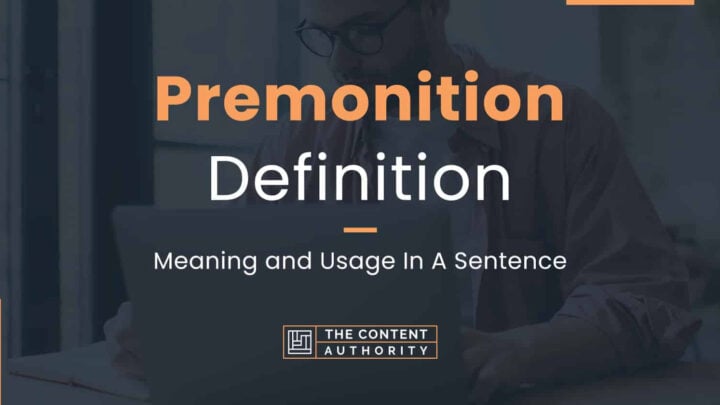Dreams are stories and images that the brain creates when people fall asleep. But did you know that what you dream can come true at times? Such dreams are premonitions; so, what is the best premonition definition, and how do you use this word in sentences?
The definition of “premonition” is “early warning sign of an event that might take place in the future. Use the word when referring to someone who gets a warning in advance of something that might happen. For example, the warning might be in the form of a dream or a feeling.
But before you start using the word “premonition,” it is vital to understand the word and its meaning. That way, you will know the best context to apply the word. More so, you will know the best times to include it in your vocabulary. Let’s help you learn more in this article.

What Is The Definition of Premonition?
The word “premonition” is a feeling of evil to come. Of course, bad things happen in life every day, and some can have devastating effects. Sometimes, someone can get the feeling before it happens, whether as a deep thought or through a dream.
One thing about “premonition” is that most people do not understand it. When it happens, most do not take action. However, the few that react end up stopping a calamity. The challenge with having suspicion is that it is not easy to tell the difference between it and a dream. It becomes difficult to react to something you think might happen, yet you do not have any evidence.
Example sentences:
- He did not get into the boat because of his premonition, which saved his life.
- Lefa always had a premonition of when a storm was coming, and she always urged the villagers to prepare.
- His premonition about his grandfather’s death was devastating because he knew nothing he could do about it.
What Are the Family Words of Premonition?
Family words share a common root but have different prefixes and suffixes in morphology. Learning a word family and the various ways you can use it in a sentence allows you to understand the word learning better.
Premonitory (adjective): A feeling of anticipation or anxiety over future events. Examples:
- There came a day when the premonitory hurricane swept the whole city.
- She thought about Brenda, her landlord, and then a cold premonitory feeling came all over her.
- Some of the patients have started developing premonitory signs and symptoms like sweating, nervousness, and tachycardia.
Promonish (verb): To warn something. Examples:
- We promonish everyone that they should not be outside past 10 p.m.
- Before the teacher could teach the institution, the manager told her that her job was to educate the students and promonish them.
- The chief’s promonish is that everyone should avoid going to the forest.
Premonitory (adverb): Describing something bad is about to happen. Examples:
- It is a personal decision to believe in premonitory dreams.
- The dream I had was premonitory, so I chose to stay indoors for the weekend.
- No one gave a second thought to his premonitory feelings.
Synonyms and Antonyms of Premonitions
Most people opt to learn a few words and their meanings. But the English language has millions of words with diverse meanings. That’s why when learning a new word, strive to know about the synonyms and antonyms of the word.
When expressing yourself, you will find a better or alternative word that you can use based on your context. Here is a look at the various synonyms and antonyms of “premonition.”
Synonyms
- Foreboding: A feeling that something bad is about to happen.
- Presage: A warning of an unwelcomed imminent event is about to happen.
- Presentiment: Having an intuitive feeling about the future, especially something bad.
- Prognostication: The action of prophesying future events.
- Anticipation: The action of anticipating something, in most cases a prediction.
- Foreknowledge: Awareness of something before it happens.
- Insight: The ability to gain an accurate or deep understanding of someone or something.
- Signs: An object quality of event whose presence or occurrence indicates the probable presence or occurrence
- Portent: A sign or warning that something momentous is about to take place
- Omen: An event regarded as the potential of both good and evil.
Antonyms
- Absence: Nonexistence or lack of something.
- Fearlessness: Not having fear.
- Compression: Failure to understand something.
- Persuasive: Someone good at persuading someone to do something
- Stupidity: Behaving in a way that shows a lack of good sense of judgment
- Knowledge: Awareness or familiarity acquired through experience or education.
- Proof: Evidence or arguments establishing the truth about a certain statement.
- Outcome: The way that things turn out.
- Aftermath: The consequences or after-effects of unpleasant effects.
What Is The Difference Between Premonition And Intuition?
A common mistake that people make when using “premonition” is to interchange it with “intuition.” But in reality, these words are not related to each other, and they have different meanings. Premonition is a clairvoyant experience like a dream or deep thought about some events that might take place in the future. On the other hand, intuition is an immediate cognition using conscious rational processes.

What Is The Meaning of Premonition?
Another meaning of “premonition” is a clairvoyant experience, like a dream that resonates with future events. In most cases, this is a word used when someone has a strong feeling of something bad happening in the future.
Example sentences:
- The premonition he had was wrong.
- Why would he not tell us of his premonition?
- Susan’s premonition was scary such that she spent the whole day in the church praying.
How to Use Premonition in a Sentence?
Note that “premonition” is a noun. So each time you use it in a sentence, keep in mind that the word identifies a future. You also need to understand that the meanings can change depending on the nature of the suspicion.
Is Premonition a Negative Word?
In most cases, premonitions are negative and usually predict something negative bound to occur in the future. But there are a few times when people have had positive premonitions. In addition, premonitions are more of suspicion, and it is not a guarantee that something will happen. So, unlike its synonyms, forewarning and foreboding, which are negative, the word premonition is neutral.
10 Examples of Premonition in a Sentence
Learning new words is among the greatest ways to improve your vocabulary. But for effective use of the word, don’t just learn the definition and meaning. Instead, know the various ways to use the word in a sentence. Here are ten example sentences with “premonition.”
- Meanwhile, premonition symptoms of revolutions took place in Geneva.
- I was busy working on a project when I got a premonition knock on the door, and I instantly knew that it would not be good news.
- Beneath the scene of panic and premonition, they all know that this is the last time they will see each other.
- I got a slight premonition of what life would be like if I accepted his proposal, and so I had no choice but to decline.
- I am afraid I have bad news; I confirm your premonitions.
- He claimed to have a premonition of how the court proceedings would unfold.
- Jane has a premonition of disaster. You have to listen to her most of the time.
- Though everyone ignored me, my premonitions were accurate.
- Unfortunately, Mrs. Alison’s premonition became a reality.
- Do premonitions come true? I would love to hear from you on this.
How Do You Spell Premonition?
The spelling of the word “premonition” is “P.R.E.M.O.N.I.T.I.ON.”
It is vital to learn the spelling of a word to avoid making a mistake when writing it down. A common mistake that people make when writing the word “premonition” is to use the suffixes “sion” or “shan.” To avoid such mistakes, take the time to understand how to spell the word.
How Do You Pronounce Premonition?
The pronunciation of the word “premonition” is “preh.muh.ni.shn.”
How Many Syllables Are In Premonition?
The word premonition has four syllables.
These syllables are pre.mo.ni.tion. The word primary syllable stress is “ni” and the second syllable stress is “pre.”
History & Etymology of Premonition
The word “premonition” is derived from the Latin word “praemonere,” which means “before.” The Latin language later used “praemonitionem” to mean “forewarning.”
In the late 14c, the Anglo-French introduced this word in their vocabulary as “premunition” to mean “forewarning” before it got introduced to English as “premonition.”
When Was Premonition First Used?
The first use of the word “premonition” was in the 1640s.
Conclusion
Learning a new word should not be boring; make it fun by learning it with your friends and creating relevant sentences together. The word “premonition” is one of those words that you will come across often, and it is best to learn the definition, meaning, and the many ways to use the word in a sentence. Note that you have understood everything about “premonition,” go ahead and use the word in sentences.
Shawn Manaher is the founder and CEO of The Content Authority. He’s one part content manager, one part writing ninja organizer, and two parts leader of top content creators. You don’t even want to know what he calls pancakes.

